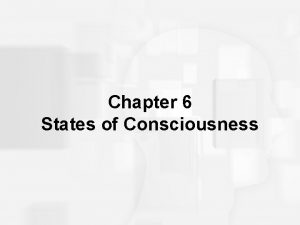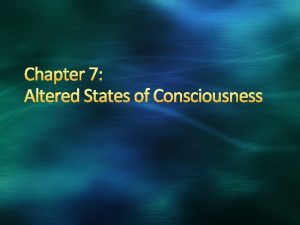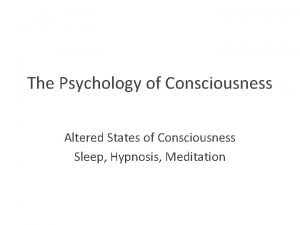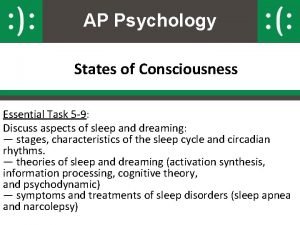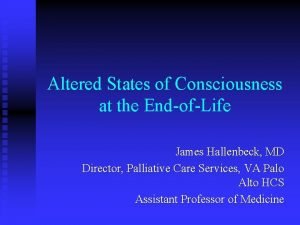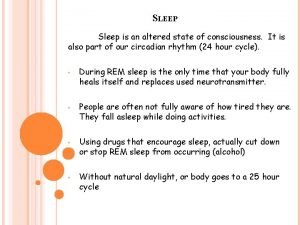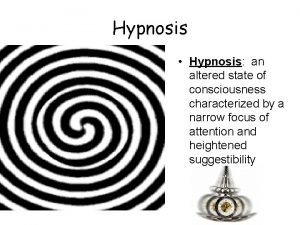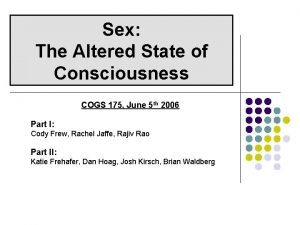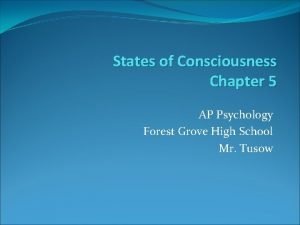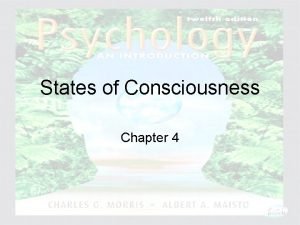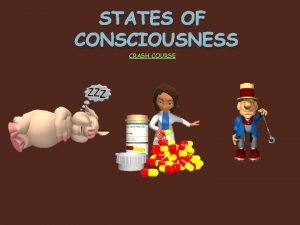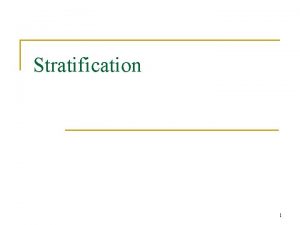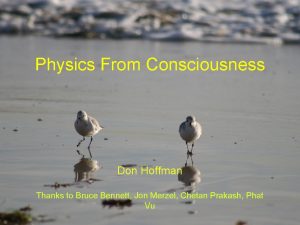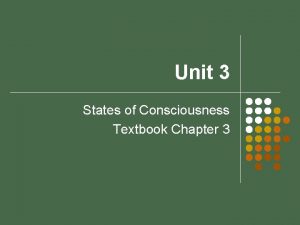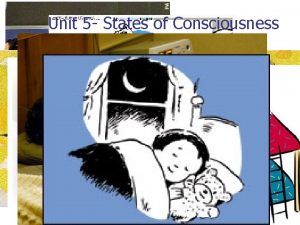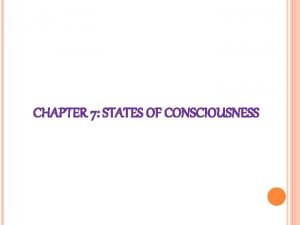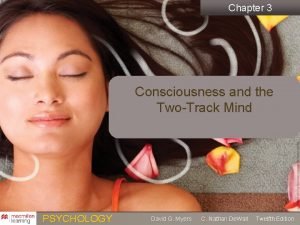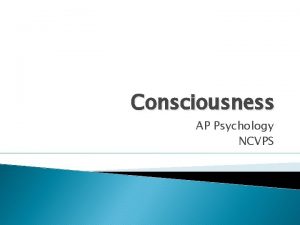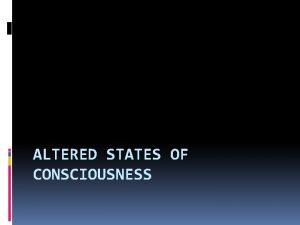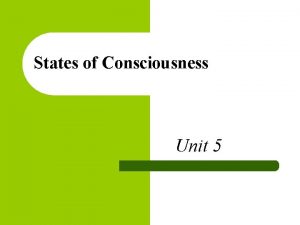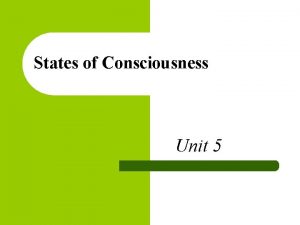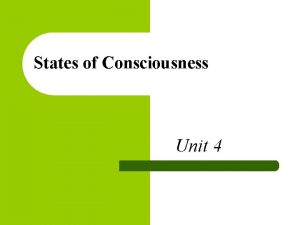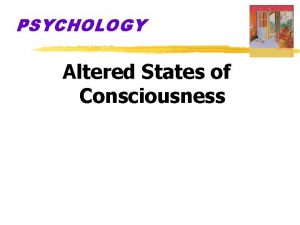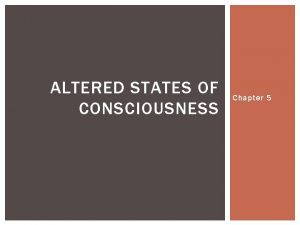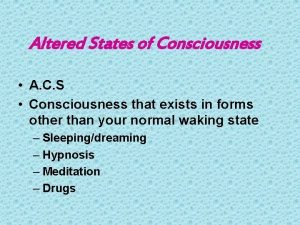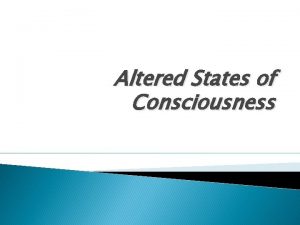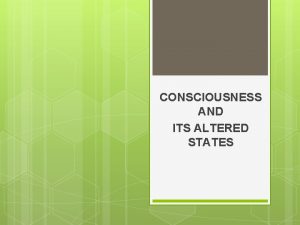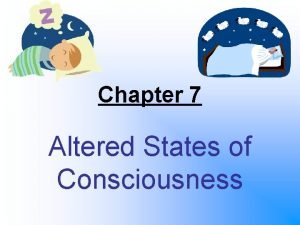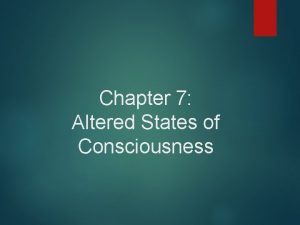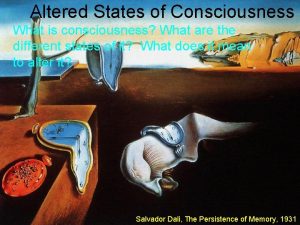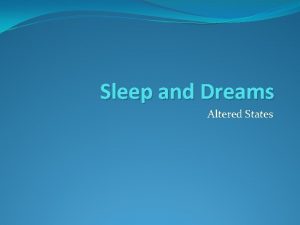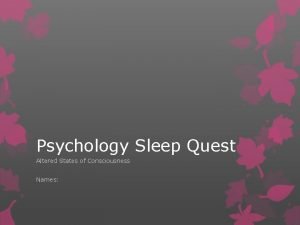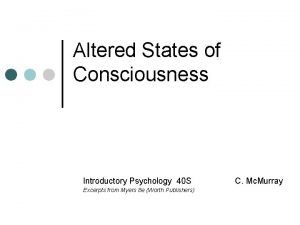The Psychology of Consciousness Altered States of Consciousness





















- Slides: 21

The Psychology of Consciousness Altered States of Consciousness Sleep, Hypnosis, Meditation

Learning Objectives Students should be able to: • Define consciousness • Summarize current beliefs about why we sleep • Describe the sleep cycle • Identify key sleeping disorders • Explain the effects of sleep deprivation • Explain why we dream

What is consciousness? • Consciousness – a persons awareness of and responsiveness to mental processes and the environment • Refers to a waking state • Other states such as sleep, hypnosis or states altered by drugs are considered to be altered states of consciousness

Circadian Rhythms- the Biological Clock Influences sleep and wakefulness Also: Blood pressure Hormones Body temperature A cycle that is connected with the 24 - hour period of the earth’s rotation The biological clock is largely governed by a cluster of neurons, called the syprachiasmatic nuclei (SCN) found in the hypothalamus. Disturbances in circadian rhythms ma result in fatigue, decreased concentration, sleep disorders and other health problems.

Altered States of Consciousness Sleep • We spend about 1/3 of our adult lives in the altered state of consciousness called sleep • Sleep is a natural state of rest characterized by a reduction in voluntary body movement and decreased awareness of surroundings. • Sleep is important for a number of reasons including: – Serves a restorative function both physically and mentally • Recuperation from physical, mental and emotional fatigue – Boost immune system – Helps cognitive functioning – Crucial to the formation of long term memories

Stages of Sleep • When we sleep we slip from consciousness to unconsciousness • Researchers use a electroencephalograph or EEG to study wave patterns during wake and sleep cycles. • Our brains emit waves characterized by certain frequencies (number of waves per second) and amplitude (height of the waves- an index of strength) • As we move into sleep the frequency of the waves decrease and amplitude increases.

Stages of Sleep • The first four stages are referred to as NREM sleep while the fifth stage is called REM sleep, so called because our eyes dart back and forth beneath our eyelids. • Stage 1: – characterized by theta waves. We may experience a hypnagogic state where we experience brief but dreamlike images. Lightest stage of sleep.

Stages of Sleep • Stage 2: – after 30 -40 min in stage 1, we go deeper into sleep. – In stage 2 brain waves produce sleep spindles – represent brief burst of rapid brain activity • Stage 3: – brain produces slower delta waves

Stages of Sleep Stage 4: deepest stage of sleep from which it is most difficult to be awakened. Delta waves continue to increase in amplitude After about 30 min in stage 4 sleep, we enter REM sleep, also called paradoxical sleep because EEG patterns suggest a level of arousal similar to that of the waking state However it is difficult to wake someone from REM sleep. Persons when awaken from this stage will report dreaming

Dreams • Dreams are imagery in the absence of external stimulation can seem real • Dreams are most vivid in REM sleep • But why do we dream? There are several explanations put forward: • Dreams as “the residue of the day”– we dream about things that have preoccupied our minds during the day – for example, illness or death, sex or aggression, moral dilemmas, traumatic events that may have occurred

Dreams Psychoanalytic View: Dreams as expression of our unconscious desires Freud says our dreams represent unconscious wishes and urges – impulses we had to censor during the day Manifest vs. latent content E. g. horseback riding – sexual intercourse, gun- penis, journey - death The activation-synthesis model of dreams – the biological view Acetylcholine and the pons stimulate responses that give rise to dreams. Dreams may begin as random brain activity, but individual personality, motivation, memories and life experiences guide how your brain constructs the dream.

Dreams Cognitive View: Dreams helps us to sort through events of the day Another way of information processing Some link found between content of dreams and waking thoughts, fears, and concerns.

Sleep Disorders • Insomnia: difficulty falling or remaining asleep throughout the night • May lead to medical and psychological disorders – Possible causes • • anxiety Drug induced Stress, depression Noise, temperature, new environment

Sleep Disorders • Narcolepsy: – a sleep disorder where a person suddenly and irresistibly falls asleep. – The sleep may last about 15 minutes, but can be dangerous as this can occur suddenly while doing tasks such as driving or working with sharp tools

Sleep Disorders Sleep Apnea: sleep disorder characterized by temporary absence or cessation of breathing. Persons may stop breathing periodically up to several hundred times per night Sleep Terrors vs. nightmares: Sleep terrors are frightening dreamlike experiences that occur during the deepest stage of NREM sleep. Can produce intense physiological arousal and feelings of panic Nightmares are frightening dreams that occur during REM sleep an which we can remember in the morning.

Sleep Disorders • Sleepwalking – Usually occurs in stage 4 sleep. – Occurs more in children than in adults – Sleep walking more common in boys • Sleep Talking – Most common in NREM sleep

Sleep Deprivation • About 1/3 and ½ of adults fail to get enough sleep. • Sleep deprivation can lead to many problems including: Reaction time slows down Logical thinking is impaired Productivity decreases and errors increase Reduces motor skills and lapses in attention that result in increased risk of automobile accidents – Increased irritability – –

Sleep Deprivation – Reduced concentration and motivation – Judgment decreases – Reduces immunity that may lead to increased risk of heart disease, asthma, stroke, high blood pressure, diabetes – Mood alteration - increased rates of depression in adolescents and college students

Hypnosis • This is an altered state of consciousness in which people are suggestible and behave as though they are in a trance. – The hypnotic trance is usually induced by asking people to narrow their attention to a small light, a spot on a wall, an object held by the hypnotist or the hypnotist’s voice. – People who are easily hypnotized are said to have hypnotic suggestibility. – These persons in general tend to be prone to fantasy, pay close attention to the instructions and want to cooperate with the hypnotist.

Meditation can refer to various ways of focusing ones consciousness to alter ones relationship to the world. It can also refer to the process of suspending thinking and allowing the world to fade away. Transcendental meditation – the practice involves people concentrating on mantras- words or sounds to achieve an altered state of consciousness Mindfulness meditation – provides clients with techniques they can use to focus on the present moment rather than ruminate about problems

References • Morris, C. G. & Maistro, A. A. (2010). Understanding Psychology (9 th Ed. ). Upper Saddle River, NJ: Prentice Hall • Rathus, S. A. (2007) Psychology: Concepts and Connections (8 th Ed. ). Belmont, CA: Thomson Wadsworth. •
 Lesson quiz 7-1 altered states of consciousness
Lesson quiz 7-1 altered states of consciousness Circadian rhythm def
Circadian rhythm def Chapter 7 altered states of consciousness
Chapter 7 altered states of consciousness Altered state of consciousness psychology
Altered state of consciousness psychology Sleep theories ap psychology
Sleep theories ap psychology Altered state of consciousness psychology
Altered state of consciousness psychology Altered state of consciousness psychology
Altered state of consciousness psychology An altered state of consciousness
An altered state of consciousness Hypnotic states
Hypnotic states Sex altered state of consciousness
Sex altered state of consciousness Latent dreams definition
Latent dreams definition Ap psychology states of consciousness
Ap psychology states of consciousness Ap psychology states of consciousness
Ap psychology states of consciousness Altered states game
Altered states game Crash course altered states
Crash course altered states Class consciousness vs false consciousness
Class consciousness vs false consciousness Unit 5 states of consciousness
Unit 5 states of consciousness 3 states of consciousness
3 states of consciousness Unit 5 states of consciousness answers
Unit 5 states of consciousness answers Chapter 7 states of consciousness
Chapter 7 states of consciousness What is the place of consciousness in psychology's history
What is the place of consciousness in psychology's history Consciousness definition ap psychology
Consciousness definition ap psychology
